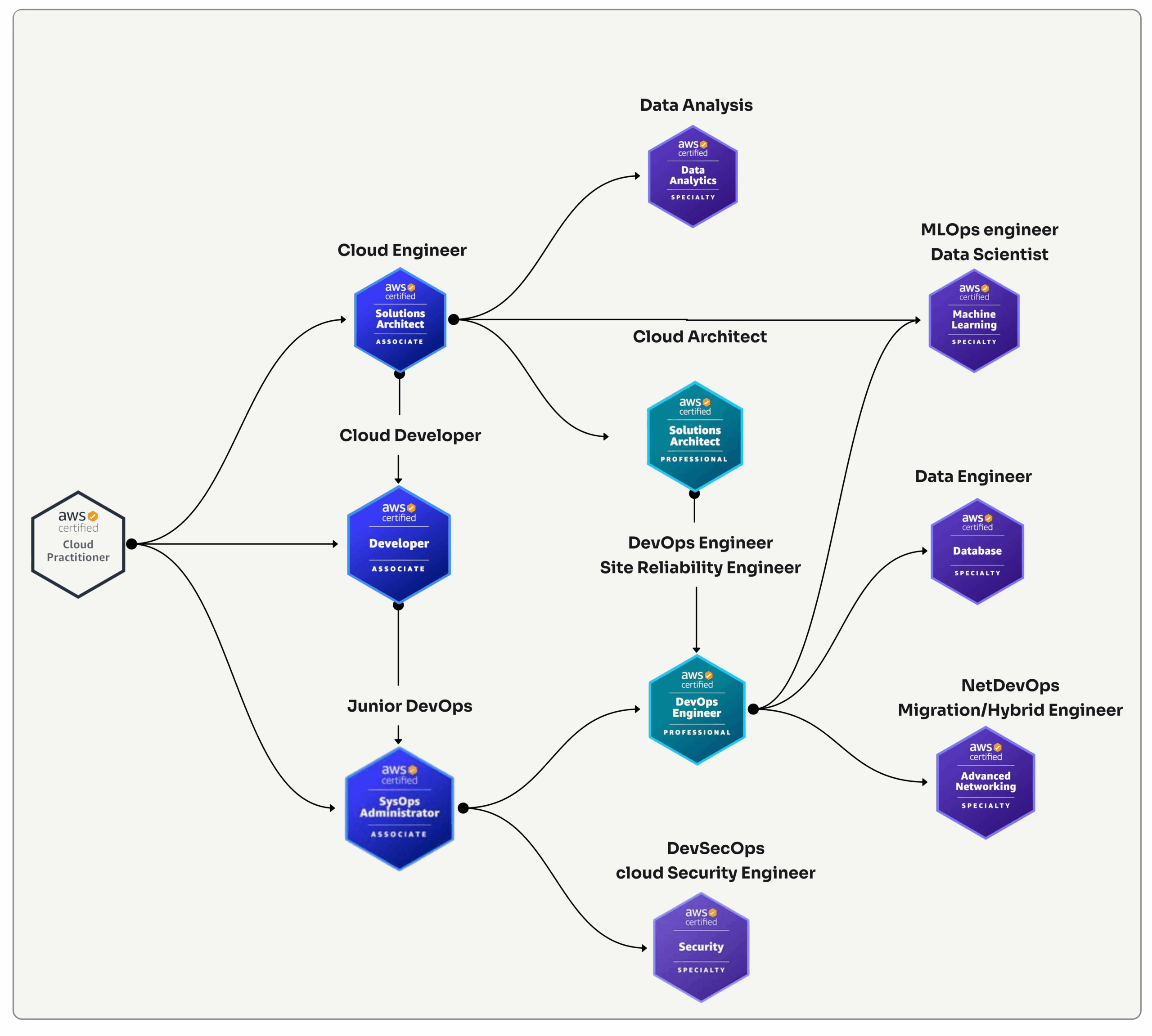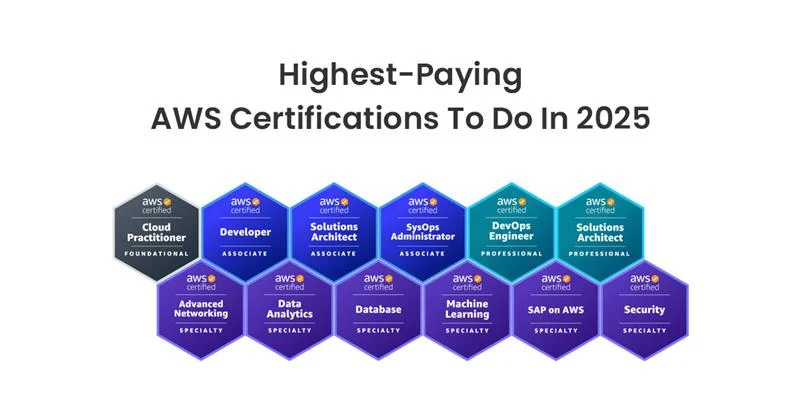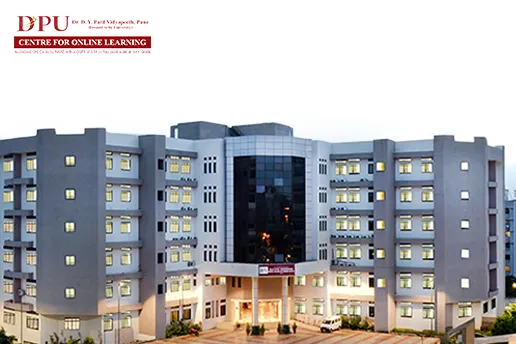Which AWS Certification Should You Choose in 2025?
Table of Contents

The cloud computing world in 2025 is more competitive and innovation-driven than ever before. Among the leaders in the cloud domain, Amazon Web Services (AWS) remains at the forefront. As businesses rapidly transition to cloud-native infrastructure, the demand for professionals with verified expertise in AWS is soaring. That’s where an AWS certification comes into play.
Whether you’re a beginner exploring IT careers or a seasoned professional aiming to sharpen your edge, choosing the right AWS certification can open new opportunities, increase your credibility, and accelerate your growth in the tech industry.
But here’s the challenge: with multiple levels and specialisations, the AWS certification path can seem confusing to navigate, especially with updates in exam formats, industry focus areas, and evolving job roles in 2025.
Why AWS Certifications Matter in 2025?
An AWS certification is far more than a shiny badge on your LinkedIn profile—it’s a globally recognised validation of your skills in managing cloud systems. Companies across sectors—finance, healthcare, retail, manufacturing, startups, and government—use AWS. Thus, certified professionals are in high demand.
Here’s what an AWS certification can do for you in 2025:
- Increase your visibility in job markets.
- Validate your cloud fluency and technical skills.
- Improve your chances of promotion or higher pay.
- Equip you with the knowledge to build secure, scalable, and cost-effective cloud solutions.
- Help you access exclusive events, communities, and learning programs provided by AWS.
More importantly, an AWS certification acts as a gateway to structured AWS training and helps guide your learning through clearly defined milestones.

*wp-media.cloudairy.com
Understanding the AWS Certification Path
Before choosing a certification, it’s important to understand the AWS certification path. AWS offers certifications in different tiers:
- Foundational
- Associate
- Professional
- Specialty
This hierarchical structure allows individuals to select an AWS certification based on their experience level, career goals, and technical proficiency.
Each level of AWS certification focuses on specific skill sets, roles, and responsibilities. For instance, foundational certifications are ideal for those new to cloud technology, while professional-level certifications are designed for experienced architects and engineers who manage complex cloud environments.
Let’s explore each tier starting from the foundational level.

*skillgigs.com
Foundational Level: AWS Certified Cloud Practitioner
Who Should Take It?
This is the entry point in the AWS certification path. It’s ideal for:
- Beginners with no technical background.
- Business professionals and managers working with cloud teams.
- Sales or finance professionals in cloud service companies.
- Students or fresh graduates interested in cloud computing.
The AWS Certified Cloud Practitioner credential offers a high-level overview of the AWS ecosystem. It does not dive deep into coding or system design but covers essential concepts of cloud infrastructure.
What You’ll Learn?
- Core AWS services (like EC2, S3, and RDS)
- Basic security and compliance models
- Billing and pricing
- Cloud computing principles
- AWS support plans
This AWS certification helps you understand the language of the cloud and is a great foundation for any advanced AWS course or AWS training.
How to Prepare?
To pass the exam confidently, follow these steps:
- Enroll in an AWS course designed for Cloud Practitioner certification.
- Review whitepapers on the AWS shared responsibility model and cloud economics.
- Use flashcards to remember service names and functions.
- Practice using AWS Free Tier to explore real services.
- Take mock tests to get comfortable with exam patterns.
Even if you have a technical background, don’t skip this certification if you’re new to AWS. It builds a strong base and helps you move upward along your AWS certification path smoothly.
Associate Level Certifications
Once you’ve cleared the foundational level, the next stop in your AWS certification path is the Associate level. This tier is crucial because it tests your ability to design, deploy, and maintain AWS infrastructure in real-world situations. There are three Associate-level certifications to choose from, each designed for a different job role.
Let’s examine each one:
1. AWS Certified Solutions Architect – Associate
Who It’s For?
This AWS certification is tailored for those who want to become cloud architects — professionals responsible for designing scalable, secure, and highly available systems on AWS.
What You’ll Learn?
- Designing architecture using services like EC2, VPC, ELB, and S3.
- Cost optimisation and fault-tolerant solutions.
- Identity and Access Management (IAM).
- Monitoring and logging strategies.
How to Prepare?
- Start with a structured AWS course that focuses on architecture best practices.
- Use AWS’s official architecture diagrams and case studies.
- Get hands-on experience with deploying multi-tier applications.
- Participate in forums or discussion groups for architectural decision-making scenarios.
2. AWS Certified Developer – Associate
Who It’s For?
This AWS certification suits developers who build and deploy applications on the AWS platform. It’s ideal for those familiar with programming languages and cloud-based APIs.
What You’ll Learn?
- Developing serverless applications using Lambda.
- Managing data with DynamoDB and S3.
- Integrating AWS SDKs in your code.
- Working with SQS, SNS, and API Gateway.
How to Prepare?
- Choose an AWS course that includes hands-on coding exercises.
- Practice deploying APIs and managing compute resources.
- Use AWS training labs to create real-time applications.
- Read the documentation for each service to understand its behaviour under different use cases.
3. AWS Certified SysOps Administrator – Associate
Who It’s For?
This AWS certification is designed for system administrators who manage and operate cloud systems. It focuses more on monitoring, deployment, and troubleshooting than coding.
What You’ll Learn?
- Automation with CloudFormation and CLI.
- Performance tuning and system optimisation.
- Logging and metrics via CloudWatch.
- Security and access management.
How to Prepare?
- Pick an AWS course focused on infrastructure operations.
- Experiment with load balancing, autoscaling, and EC2 configurations.
- Simulate failures and recovery processes.
- Use exam simulations to practice scenario-based questions.
Choosing the Right Associate-Level AWS Certification
Here’s a quick way to choose which AWS certification is right for you at the associate level:
- Choose Solutions Architect if you love system design and cloud strategy.
- Choose Developer if you enjoy programming and building serverless applications.
- Choose SysOps Administrator if you’re more interested in automation, monitoring, and cloud operations.
Each of these certifications lays the groundwork for advanced AWS training and future professional-level credentials. More importantly, they unlock real job roles and boost your salary potential.
Why Associate Certifications Are Crucial in Your AWS Certification Path?
- They act as prerequisites for Professional-level certifications.
- Help you understand how AWS services interact with each other.
- Allow employers to assess your problem-solving abilities and practical understanding of cloud environments.
- Provide you with confidence and hands-on experience to manage AWS-based solutions independently.
Professional & Specialty AWS Certifications
After gaining a strong foundation with the Foundational and Associate certifications, your journey along the AWS certification path continues into more advanced territory—the Professional and Specialty certifications. These credentials are designed for experienced cloud professionals looking to master AWS services and prove their skills in highly demanding environments.
In 2025, enterprises are placing even more emphasis on these certifications due to the complexity of cloud infrastructure, the growing importance of automation, and the rise of specialised domains like machine learning and cloud security.
Professional-Level AWS Certifications
The Professional-level certifications are among the most challenging and rewarding credentials in the AWS certification path. There are currently two main certifications in this tier:
- AWS Certified Solutions Architect – Professional
- AWS Certified DevOps Engineer – Professional
Let’s break them down.
1. AWS Certified Solutions Architect – Professional
Who Should Take It?
This AWS certification is designed for individuals with two or more years of hands-on experience designing and deploying cloud architecture on AWS. It’s ideal for senior solutions architects, enterprise architects, and cloud consultants who work on complex cloud-native solutions.
What You'll Learn?
- Advanced AWS architecture and design principles
- Multi-account architecture
- Hybrid cloud connectivity
- Automation with CloudFormation and Terraform
- Cost control and governance
- Business continuity planning
- Security best practices across large-scale infrastructure
Why It Matters in 2025?
As cloud environments become more distributed and enterprise workloads grow in scale, organisations seek professionals who can design architectures that are fault-tolerant, resilient, and cost-optimised. This AWS certification proves your ability to meet those needs.
How to Prepare?
- Choose a specialised AWS course focused on the professional exam format.
- Study complex architectures involving multi-region failover and DR.
- Practice with AWS training labs that require infrastructure automation and migration.
- Read AWS whitepapers (Well-Architected Framework, Security Best Practices).
- Use exam simulators and deep-dive guides to identify weak spots.
2. AWS Certified DevOps Engineer – Professional
Who Should Take It?
This AWS certification is for professionals with strong experience in CI/CD, monitoring, automation, and infrastructure-as-code. DevOps engineers, automation architects, and site reliability engineers often pursue this path.
What You'll Learn?
- Advanced continuous integration and delivery (CI/CD)
- Infrastructure as code using CloudFormation and CDK
- Monitoring and incident response using CloudWatch, X-Ray, and SNS
- Deployment strategies (blue/green, canary, rolling updates)
- Log management and analytics
- Governance and compliance automation
How It’s Changing in 2025?
With serverless adoption, containerisation (EKS, ECS, Fargate), and GitOps workflows gaining traction, this AWS certification is more relevant than ever. It emphasises deep automation and continuous delivery skills.
How to Prepare?
- Enroll in a project-based AWS course that simulates real-world deployment scenarios.
- Set up CI/CD pipelines using AWS CodePipeline and CodeDeploy.
- Automate multi-stage deployments for serverless and containerised apps.
- Utilise AWS training that includes real system failures, remediation simulations, and rollback strategies.
Choosing Between the Two
| Certification | Best For |
|---|---|
| Solutions Architect – Professional | Designing end-to-end AWS systems at enterprise scale |
| DevOps Engineer – Professional | Automating infrastructure and managing application lifecycles |
These certifications can complement each other, especially for professionals who work in both architecture and DevOps. However, each requires significant preparation and hands-on experience. Advancing on your AWS certification path to the professional level also means committing to mastering AWS inside and out.
Specialty-Level AWS Certifications
The Specialty tier focuses on specific technical domains and offers deep expertise in key areas like security, data analytics, machine learning, and networking. These certifications allow professionals to specialise in a particular AWS domain and are often paired with a Professional-level credential.
There are currently several specialty certifications available in the AWS certification path:
- AWS Certified Advanced Networking – Specialty
- AWS Certified Security – Specialty
- AWS Certified Machine Learning – Specialty
- AWS Certified Data Analytics – Specialty
- AWS Certified Database – Specialty
- AWS Certified SAP on AWS – Specialty
Let’s explore some of the most in-demand ones in 2025.
1. AWS Certified Security – Specialty
Who Should Take It?
Security professionals, cloud architects, and compliance officers should consider this AWS certification to deepen their understanding of securing cloud environments.
What You'll Learn
- Identity and access management (IAM, SSO, SCPs)
- Data encryption at rest and in transit
- Secure access to AWS services
- Incident response and forensic logging
- Compliance frameworks (HIPAA, GDPR, SOC 2)
AWS Training Recommendations
- Opt for an AWS course centred around real-world security breaches and simulations.
- Use security-focused labs from official AWS training platforms.
- Deploy auditing, monitoring, and alerting systems using GuardDuty, Security Hub, and AWS Config.
2. AWS Certified Machine Learning – Specialty
Who Should Take It?
Data scientists, AI engineers, and developers using AWS for machine learning workloads will benefit from this AWS certification.
What You'll Learn
- Data engineering for ML workflows
- Feature engineering and model tuning
- Training models using SageMaker
- Deploying and monitoring machine learning endpoints
- Choosing appropriate ML algorithms
AWS Course Tips
- Choose an ML-specific AWS course with hands-on Jupyter notebook labs.
- Get practical experience using SageMaker Studio and built-in algorithms.
- Review AWS’s ML lens whitepaper and experiment with real datasets.
3. AWS Certified Advanced Networking – Specialty
Who Should Take It?
Network engineers, cloud architects, and DevOps engineers who manage hybrid or global-scale networking.
What You'll Learn
- AWS Direct Connect, VPN, VPC Peering, and Transit Gateway
- Routing architectures for hybrid environments
- Network performance monitoring and optimisation
- Load balancing and multi-region failover
AWS Training Path
- Take a deep dive AWS course focused on enterprise-grade connectivity.
- Use AWS training scenarios for cross-region networking and failover.
When to Pursue a Specialty AWS Certification
You should only pursue a Specialty AWS certification if:
- You have deep domain knowledge in that area.
- You’re looking to niche down in your cloud career.
- Your current role or a desired job listing requires it.
- You’ve already completed at least one Associate or Professional AWS certification.
While these certifications are technically open to anyone, the complexity level is high. So, make sure your AWS training includes role-specific labs and challenges.
Summary of AWS Certifications Beyond Associate Level
| Level | Certification | Purpose |
|---|---|---|
| Professional | Solutions Architect | Design advanced AWS systems at scale |
| Professional | DevOps Engineer | Automate and manage cloud infrastructure lifecycles |
| Specialty | Security, ML, Networking, Data Analytics | Deep expertise in targeted domains |
Each of these paths demands a specific mix of experience, focused AWS course content, rigorous AWS training, and exam readiness.
Mapping AWS Certifications to Careers in 2025
As organisations continue to migrate workloads to the cloud and integrate advanced technologies, AWS certification holders are becoming indispensable in nearly every IT department. But choosing the right certification isn’t just about passing exams — it’s about aligning with your long-term career goals.
Below is a breakdown of real-world job roles and how each certification fits into your AWS certification path in 2025.
Career Paths Based on AWS Certifications
1. Cloud Engineer / AWS Engineer
- Recommended Certifications:
- AWS Certified Solutions Architect – Associate
- AWS Certified SysOps Administrator – Associate
- AWS Certified Developer – Associate
- Why: These certifications build a broad foundation and hands-on skills in deploying, configuring, and maintaining AWS environments.
2. Cloud Solutions Architect
- Recommended Certifications:
- AWS Certified Solutions Architect – Professional
- AWS Certified Security – Specialty
- AWS Certified Advanced Networking – Specialty
- Why: These roles demand strong architectural knowledge and the ability to create cost-effective, secure, and scalable solutions.
3. DevOps Engineer
- Recommended Certifications:
- AWS Certified DevOps Engineer – Professional
- AWS Certified SysOps Administrator – Associate
- AWS Certified Security – Specialty
- Why: DevOps engineers focus on automation, CI/CD pipelines, and operational excellence — all of which are deeply covered in these AWS certification tracks.
4. Data Scientist / Machine Learning Engineer
- Recommended Certifications:
- AWS Certified Machine Learning – Specialty
- AWS Certified Data Analytics – Specialty
- AWS Certified Cloud Practitioner
- Why: These certifications provide data engineering and ML-specific tools (e.g., SageMaker) along with foundational AWS knowledge.
5. Network Architect
- Recommended Certifications:
- AWS Certified Advanced Networking – Specialty
- AWS Certified Solutions Architect – Professional
- Why: These certifications equip professionals to handle complex routing, security, and hybrid-cloud connectivity at scale.
Strategic Planning of Your AWS Certification Path
Rather than jumping into the most popular AWS certification, it’s smarter to follow a layered, well-planned approach. Here’s how you can do it:
Step 1: Start with the End in Mind
Ask yourself:
- What role do I want?
- What skills do I already have?
- What domains (security, networking, ML) interest me?
Knowing your destination makes it easier to map the best AWS certification path.
Step 2: Choose a Base Certification
If you’re a beginner, start with:
- AWS Certified Cloud Practitioner (for business, sales, and non-technical roles)
- Any Associate-level certification (for hands-on technical professionals)
Pick one that matches your domain — architecture, development, or operations.
Step 3: Move to Advanced Certifications
Once you have a solid foundation, pursue:
- Professional-level certifications to demonstrate mastery
- Specialty certifications for deeper domain-specific skills
This progression ensures that each AWS course you take builds on your existing expertise and aligns with real industry needs.
Recertification and Validity in 2025
AWS certifications are valid for 3 years, and AWS encourages re-certification to ensure professionals stay updated.
Tips for Recertification
- Review changes to AWS services and pricing models.
- Revisit your AWS course materials with updated content.
- Take the latest AWS training simulations that reflect current industry trends.
- Consider branching out into a new domain or Specialty area to deepen your skillset.
Combining Multiple Certifications: Is It Worth It?
Absolutely. In fact, combining certifications strategically multiplies your value in the job market. Here are some powerful combinations:
| Combo | Best For |
|---|---|
| Solutions Architect – Associate + Security – Specialty | Enterprise Security Architects |
| Developer – Associate + DevOps Engineer – Professional | Full-Stack DevOps Professionals |
| Data Analytics – Specialty + ML – Specialty | AI/ML Cloud Engineers |
| SysOps – Associate + Advanced Networking – Specialty | Network-Centric Cloud Admins |
Multiple certifications help you demonstrate depth and versatility — a trait increasingly sought after by employers in 2025.
Salary Prospects for AWS Certification Holders
Let’s talk about money. One of the top reasons professionals pursue AWS certification is salary advancement. In 2025, certified professionals earn approximately:
| Role | Average Global Salary (USD) |
|---|---|
| AWS Cloud Practitioner | $90,000 |
| AWS Developer – Associate | $105,000 |
| Solutions Architect – Associate | $115,000 |
| DevOps Engineer – Professional | $135,000 |
| Solutions Architect – Professional | $140,000–$160,000 |
| Security / Networking Specialty | $140,000+ |
| Machine Learning Specialty | $145,000+ |
With the right combination of AWS training, hands-on projects, and certification prep, these roles become accessible and financially rewarding.
AWS Training Tips for Maximum Success
To crack any AWS certification exam, you need more than just theory. Here are smart tips to master the required skills:
Choose the Right AWS Course
Always opt for an AWS course that includes hands-on labs, quizzes, and real-world scenarios. Look for instructors who are certified and experienced.
Use the AWS Free Tier
Get your hands dirty! Practice creating EC2 instances, S3 buckets, IAM roles, Lambda functions, and more.
Join Study Groups & Forums
Communities like Reddit, Discord, and AWS Discussion Forums help clarify doubts and simulate interview environments.
Use Official AWS Whitepapers
AWS publishes detailed whitepapers like the Well-Architected Framework, which are goldmines for certification exams.
Attempt Multiple Practice Exams
Don’t underestimate practice. It helps you understand time management, question formats, and your weak areas.
Final Thoughts
In 2025, cloud computing is not just an IT trend — it’s the backbone of digital transformation. And the demand for certified professionals is outpacing the supply. The right AWS certification can set your career on a powerful trajectory, helping you earn more, lead cloud-native projects, and even shift roles or industries.
But remember, the certification is just one piece. You must combine it with continuous AWS training, practical implementation, and a learner’s mindset.
If you plan your AWS certification path carefully — based on your interests, strengths, and goals — there’s no limit to what you can achieve.
Summary: Which AWS Certification Should You Choose?
| Experience Level | Recommended Certifications |
|---|---|
| Absolute Beginner | AWS Certified Cloud Practitioner |
| Entry-Level Tech Professional | Associate-level Certifications |
| Experienced Cloud Engineer | Professional Certifications |
| Specialised Role (e.g., ML, Security) | Specialty Certifications |
Each AWS certification opens doors — but which door you walk through is up to you.
Frequently Asked Questions
Can I pursue an AWS certification if I come from a non-technical background?
Yes, individuals from non-technical backgrounds can start with the AWS Certified Cloud Practitioner. This entry-level certification is designed to help business analysts, project managers, and sales professionals understand the basics of cloud computing and AWS services without requiring coding or deep IT knowledge.
How long does it typically take to prepare for an AWS certification exam?
Preparation time varies based on your experience and the certification level. On average:
- Cloud Practitioner: 2–4 weeks
- Associate-level: 1–2 months
- Professional-level and Speciality: 3–5 months
Consistent study, hands-on labs, and mock exams can speed up your readiness.
Is it necessary to take an official AWS training course to pass the exam?
No, it’s not mandatory to take official AWS training, but it’s highly recommended. Some candidates self-study using books, video tutorials, and community resources. However, structured AWS course content can provide clarity, hands-on labs, and expert support that significantly boost your chances of passing.
Can AWS certifications help in getting freelance or remote jobs?
Absolutely, many employers, including startups and global companies, look for AWS certification as a validation of skills, especially for remote or freelance roles in cloud infrastructure, DevOps, and development. Platforms like Upwork, Freelancer, and Toptal often list AWS-certified professionals as preferred candidates.
What happens if I fail an AWS certification exam?
If you don’t pass the exam, you can retake it after 14 days. AWS allows unlimited attempts, but you must pay the full exam fee each time. It’s advisable to analyse your previous attempt, strengthen weak areas through updated AWS training, and try again with better preparation.














![Top-10-Ultimate-AWS-Projects-&-Ideas-[2025]](https://jaro-website.s3.ap-south-1.amazonaws.com/2024/09/Top-10-Ultimate-AWS-Projects-Ideas-2025-1.webp)



